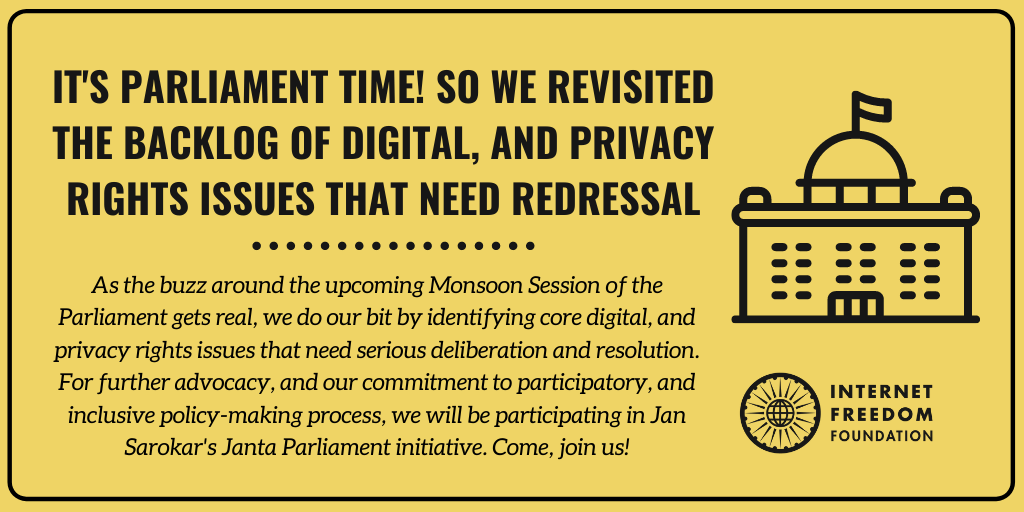
tl;dr
The 2020 Parliamentary Budget Session had to be cut short 12 days ahead of schedule due to the COVID-19 pandemic. This meant that a lot of time that would have been dedicated to the discussion of pressing issues was lost. Meanwhile, fresh issues, especially in the domain of digital, and privacy rights have arisen. These problems required urgent parliamentary deliberation and oversight. With the upcoming Monsoon Session offering a glimmer of hope, we urge our Parliamentarians to take note of issues in the domain of data, privacy, and digital rights. Since a truncated session might be on the cards, we identify core issues as ‘prioritization and efficiency’ will be realistically how this session may be structured.
The 2020 Parliamentary Monsoon Session: Lite Version?
‘Better late than never’ is the sentiment as indications emerge that the Monsoon Session of the Parliament for this year may soon be announced. While an official announcement is still awaited, various news reports over the past few weeks have claimed that parliament might commence around Late August-Early September.
It has been rumoured that to ensure that social distancing protocols are followed, each wing of the Parliament (the Lok Sabha and the Rajya Sabha) might sit for business on alternate days --- with each wing using up halls of both the Lok Sabha and Rajya Sabha to ensure safe social distancing. On the other hand, a similar scheme but with a morning and evening shift instead of alternate days has also been suggested by some sources. Given the backlog of urgent issues the second approach is a more preferable option since the former would amount to half the time for deliberation in comparison. Whatever route is taken, it is obvious that prioritisation of issues, and procedural efficiency may dominate this session. We, sincerely believe that this is possible while maintaining a healthy balance deliberative and considered debate. To aid in this effort we have identified several core digital rights issues which may benefit from parliamentary scrutiny. This is only the first step and we intend to follow this up with correspondence with the treasury and the opposition benches.
Digital, and Privacy Rights: Important Issues and the Way Forward
A lot of developments, which have a direct bearing on every Indian citizen’s digital, data, and privacy rights have shaped up over the past few months. Website blocking, blanket app bans, deployment of intrusive surveillance technologies and continued internet shutdowns are just a few of these issues. Our team has been on its toes to make sure that citizens’ rights are duly respected and protected. To this effect, we have consistently engaged with various government ministries, legislators, civil society organisations, parliamentary committees, and the citizens themselves to vociferously advocate for a more inclusive, and rights-respecting digital ecosystem.
As an organisation that works closely with issues pertaining to digital rights, transparency, innovation, privacy protection, and civil liberties, we have consistently engaged with governmental bodies to brief them about core issues that seek immediate and foolproof redressal. From time to time, we have also come up with and advocated for policy recommendations for these issues. The following table lists the broad issues that we reckon are of utmost importance for discussion in the upcoming parliamentary session along with some broad policy recommendations that should be deliberated upon.
Janta Parliament Initiative
We definitely realise that legislative deliberation through the various activities of the Parliament is one of the most vital parts of governance and policy making in the country. Therefore, it gives us immense pleasure to be a part of the Janta Parliament initiative where more than 50 civil society organisations and citizens’ campaigns will come together for a 6-day simulated conference to convene a unique citizen driven Parliament. We have contributed to this initiative through substantive inputs towards the summary demands for analysis, demands and recommendations. This is a coordinated effort at setting out a concrete, well-researched and pragmatic agenda to address urgent COVID-19 related policy issues whenever the next parliamentary session takes place. To start off, Janta Parliament is going to hold a press briefing at 1430 hours today (13th August 2020). Therefore, we urge all media organisations to attend and be part of this unique and much needed initiative.
In conclusion, we really hope that this Independence Day our parliamentarians pledge to make the best use of the parliament to discuss and resolve urgent issues from all sectors including digital rights, and privacy during the upcoming session. This is very important because legislators are our first line of defence against breaches of rights and their diligence is essential to deepening the sense of democracy in the country. We also hope that consensus can be reached on the arrangements and starting date of the monsoon session without any further delay, and that instead of a truncated session, a fully functional and efficient session can be held.
Important Links:
1. You can read more on Jan Sarokar’s Janta Parliament initiative, and participation here. [link]
2. The Facebook event page for Janta Parliament (August 16 to August 21). [link]
